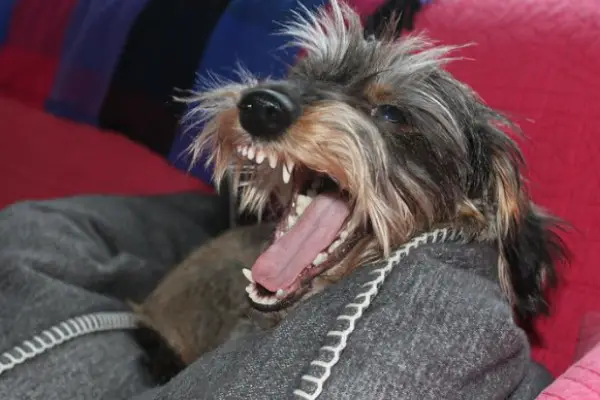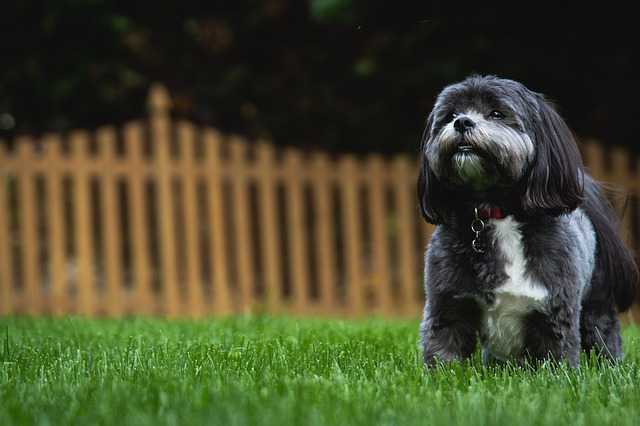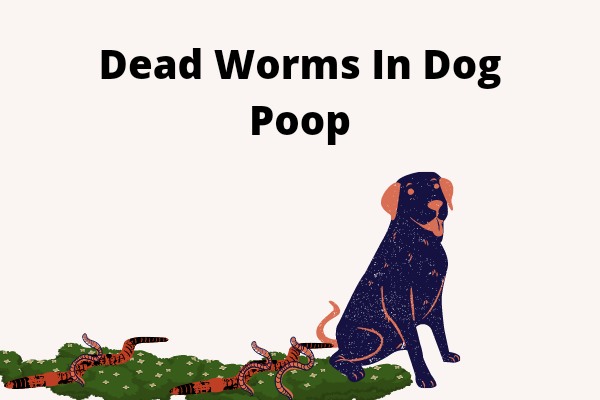Do Dachshunds Bite: 8 Bite Causes & Controls

Dogs bite for different reasons but do dachshunds bite and what are some common reasons they may but, let’s find out together!
We will outline and discuss some of the most common reasons why dachshunds may decide to bite unnecessarily.
Finally, we will also discuss some common ways to stop or train a dachshund not to bite unnecessarily. So read on!
Do Dachshunds Bite
Fear, self-defense, anxiety, over-excitement, a lack of adequate socialization and training are all causes for dachshunds to bite either when a stranger approaches or its owner.
Puppies of Dachshunds, on the other hand, may bite and nip as part of the teething process, which they will eventually outgrow.
Because dachshunds are hounds they are known to have the tendency to bite unnecessarily if not properly socialized from the puppy stages.
Why do dachshunds bite
Some of the most prevalent reasons dachshunds bite are as follows:
One of the most common reasons for dachshund behavior issues is a lack of or improper socialization, which can lead to aggressive biting if not addressed appropriately.
Socialization is important for both you and your dachshund, and it is one of the most prevalent reasons dachshunds bite.
Dachshunds have a basic lack of socialization, which results in needless biting, barking, nipping, animosity, and sudden assault.
Make sure your dachshund has been properly socialized if he bites a lot while he’s around other dogs or humans.
2. Fear
One of the most prevalent reasons for dachshund bites is fear; if your hounds, such as dachshunds, feel threatened, they may bite.
Fear drives dachshunds to engage in ineffective behaviors such as whining, barking, and biting aggression.
Keep your dachshund away from any sources of fear, or better yet, socialize them with the source of their anxiety.
Gunshots, pyrotechnics, and other loud noises can frighten dachshunds, resulting in unwarranted biting when you try to bite them.
3. Guarding behavior
If your dachshund has something precious that they don’t want to share, such as toys, food, or chews, they may bite out of dread of the desirable item being taken away.
Biting to protect valuable items is a resource guarding behavior that can be corrected with the right training.
Most hounds, such as beagles and dachshunds, have strong guarding instincts and may bite if they fear their home is being invaded or if someone in their family is in danger.
4. Intense frustration
Another condition that might contribute to biting behavior in Dachshunds is when they become very frustrated with things happening around them.
Most dachshunds will bite out of desperation if they are confined in an uncomfortable or unpleasant environment.
Because they are being held back by an owner or a leash, some dachshunds might become upset when they are unable to reach what they desire.
Dachshunds may turn and bite at anything or whoever is holding them back, a behavior known as redirection or a redirected bite.
5. Play aggression
Play aggression biting is a prevalent kind of biting that many people are unaware of.
Most dachshunds investigate the world around them by lightly biting or mouthing, and this is a habit that dogs will participate in during play.
While it is often unpleasant for us, it is an unavoidable component of how dogs interact with one another and, of course, with their toys.
6. Intense anxiety
Biting, whining, and nipping are all common negative dachshund habits.
When a dachshund is separated from its owner, it becomes angry against everyone and may bite inappropriately.
The fury generally lasts longer and is more violent, with biting occurring the bulk of the time.
Consult your veterinarian or get a second pet to keep your dachshund company to avoid dachshund separation anxiety.
Because dachshunds may grow agitated and attack anybody in their area as a result of stress, it’s vital to keep any causes of tension to a minimum.
7. Abuse or neglect
This is one of the reasons dachshunds become aggressive, which finally leads to unnecessary biting.
One of the most common ways you punish your dachshund without realizing it is by starving him.
Abuse is defined as beating, throwing items at, or yelling at your dachshund when they do something wrong.
Your dachshund will become aggressive and unbalanced as a result of all of this, resulting in unnecessary biting.
8. Teething stages
During the teething phases of a puppy’s life, Dachshunds bite everything they see.
You should be gentle with your puppy at this period and give plenty of chew toys to keep them occupied.
There’s nothing you can do to totally stop your Dachshund pups from biting and nipping.
Most dog owners don’t think of teething stages as a reason for dachshunds biting, but it doesn’t change the fact that they still bite.
During the teething stage, you should begin training your dachshund not to bite.
Ways to stop dachshunds from biting
Some common strategies for preventing or educating dachshunds not to bite are as follows:
1. Excessive enthusiasm should be avoided at all costs
When playing with you or a toy, dachshund puppies may grow overly excited and bite out of excitement.
You don’t want to encourage such behavior, therefore, you should stop playing or remove the thing that is causing your pup to feel aroused as soon as your puppy nips at you.
This will teach your dachshund that they must behave if they want to have fun with you and their toys.
You should also make sure that your dachshund puppy receives adequate exercise on a daily basis.
Boredom might lead to a puppy biting or becoming overly excited during playtime.
2. Invest time in obedience training sessions
Training your dachshund benefits him not only in terms of a good life but also in terms of how he interacts with his surroundings.
Give your dachshund basic training at the very least, and maintain your dog’s training throughout its life to reinforce the abilities you’ve taught it.
When your dachshund attacks needlessly, instead of scolding or yelling at him, make the appropriate modifications.
Teething toys are the most effective approach to teach your puppy not to bite while he or she is still a puppy.
You may use positive reinforcement to teach your dachshund not to bite or to shift his attention away from biting.
This is one of the most crucial things to do if you want a dachshund that is calm and doesn’t assault other animals.
Early socializing is essential for your dachshund to avoid developing a number of undesirable tendencies in the future.
Dachshund socialization methods include:
- Walking your dachshund down your street on a daily basis.
- Taking your dachshund to dog parks.
- Weekend visits with your dachshund to family members.
- Take your dachshund for short camping with you and your buddies.
- Make sure your dachshund has enough of dog cartoon movies and TV series to watch.
- Puppy lessons are available for your dachshund.
- Take as many vacations as you can with your dachshund.
4. Teach your pup to accept hands close to his mouth
You must train your dachshund not to bite your hands while they are close to his or her mouth.
To achieve this, give them a little reward and quickly take it from their mouth.
All of this is just to guarantee that your dachshund understands that biting is never appropriate or necessary.
Allow your dachshund to take as many goodies from your hands as he likes, then gently take them off his mouth.
Brush your dachshund’s teeth once in a while as a token of appreciation for allowing you to brush his teeth.
5. Teach your pup to avoid distractions
Dachshunds may be aggressive in certain situations. Because people are more approachable, many dogs get defensive when they see them.
To avoid unwanted biting, teach your dachshund to ignore other dogs, distractions, and humans.
The most successful method is to provide positive reinforcement.
If your dachshund becomes protective when you go by people or other dogs, you reward him and put him in ‘time out.’
The dog will only be required to stay still and safe while you give him his treat.
If you utilize gifts to distract and keep your dachshund engaged, you can teach him to keep walking.
6. Try desensitization
Loud sounds or noises are one of the things that make dachshunds afraid, so be careful not to expose your dachshund to them.
The main purpose of these is to educate your dachshund that loud noises aren’t a threat and that he or she should stay calm in the presence of them.
If your dachshund becomes agitated when the doorbell rings, familiarize him with the doorbell.
Call the mailman and socialize him with your dachshund if your dachshund can’t tolerate seeing the mailman.
What should I do if my dachshund bites me
The most essential thing to do if your dachshund bites you or someone else is to treat it as if it were a human bite.
Take your dog to the vet for treatment, and be sure to speak with a skilled medical professional.
It’s also a good idea to consult a veterinarian for a diagnostic so you can figure out what’s causing your dog to snap.
If there isn’t a vet nearby, go to a clinic to get the bite cured; if there isn’t a clinic nearby, wash the affected area under running water.
Before going to the clinic for proper treatment, clean the area with any type of alcohol for the most part.
It may be useful to take your dog to a behaviorist if he is displaying symptoms of anxiety.
The main problem is that most dog owners are inexperienced in spotting the signs of a phobia or phobia-related disorder in their dog.
I hope with all the above information provided on this page, your question do dachshunds bite was answered!






